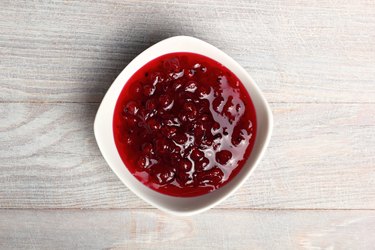
You may find a lot of unfamiliar items when you read the ingredient list on packaged foods. However, many of the items you see listed, like cellulose gum, have been used for centuries to improve shelf life, flavor and texture of various foods, according to the Academy of Nutrition and Dietetics.
Even though cellulose gum may be considered generally recognized as safe (GRAS) by the U.S. Food & Drug Administration, you may have concerns about whether it's safe for you. However, for most people, cellulose gum is harmless.
Video of the Day
Video of the Day
Tip
For most people, cellulose gum isn't harmful. However, the food additive has been identified as the cause of a severe allergic reaction in one recent case study.
All About Cellulose Gum
From baked goods to ice cream to tortillas, cellulose gum is found in many food items throughout your grocery store. But you may wonder what this unfamiliar ingredient really is. After all, it's not an item you use in your homemade baked goods.
Cellulose gum is a food additive manufacturers use as a thickening agent and food stabilizer to prolong shelf life. More specifically, the cellulose gum in your packaged cupcakes locks in moisture and keeps your sweet treat from going stale. It also thickens sauces so they're not watery when you pour them over your pasta.
The food additive also slows down the formation of ice crystals in your ice cream. Nothing ruins a yummy bowl of ice cream more than freezer burn. Cellulose gum is also used as a replacement for fat to help reduce the fat content to create low-fat treats.
Manufacturers of cellulose gum make the food additive from the structural parts of various plants, such as trees or cotton, says the International Food Additive Council. Unlike other types of gelling agents, such as gelatin, the Vegetarian Resource Group classifies cellulose gum as vegan.
Cellulose Gel Explained
Like cellulose gum, cellulose gel is a food additive. According to the Food and Agricultural Organization of the United Nations, cellulose gel, also called microcrystalline cellulose, is used as a food stabilizer, as an emulsifier to keep fat and water from separating and as an anticaking agent to prevent formation of clumps. It's also made from plants, so you can consider cellulose gel vegan too.
Though not the same as cellulose gum, this food additive is of interest because of its potential health benefits. According to a September 2017 review published in Carbohydrate Polymers, early research indicates that cellulose gel may have nutraceutical and functional food properties.
Often used as a control in dietary fiber studies, cellulose gel in food may benefit gastrointestinal health and improve blood lipid levels. Though cellulose gel looks promising, the authors of the review suggested that more research is needed before claims can be made.
Is Cellulose Gum Harmful?
Cellulose gum is unlikely to cause harm in most people. However, the food additive may be harmful if you're allergic to it. It may also exacerbate irritable bowel syndrome (IBS) symptoms in some people.
Tip
Cellulose is a type of insoluble fiber that adds bulk to your stool and has a laxative-like effect. If you have a gastrointestinal condition, such as irritable bowel syndrome (IBS) or inflammatory bowel disease (IBD), fiber may be friend or foe depending on your symptoms. For example, eating a diet high in fiber may help prevent IBD, according to a September 2018 review published in the Indian Journal of Gastroenterology.
For the record, the cellulose gum added to your ice cream or packaged cupcakes may not have the same benefits. To improve gut health and reduce risk of chronic diseases like IBD, you may be better off getting your cellulose from whole foods, such as beans and vegetables.
Though very rare, cellulose gum may be harmful if you're allergic to the food additive. A case study published in the March 2019 issue of Pediatrics, described a case in which a 14-year-old girl had an anaphylactic reaction (life-threatening allergic reaction) to an unknown substance later identified as cellulose gum. The authors of the case report noted that the exact mechanism of the allergic reaction is unclear, but theorize it may be related to the microbes in the gut.
The authors of a May 2017 article published in the Journal for Nurse Practitioners, note that people with IBS who develop symptoms (bloating, belly pain, diarrhea and/or constipation) from various foods may also be sensitive to food additives like cellulose gum. However, before you cut foods out of your diet, consult with your primary care provider or a registered dietitian.
- Academy of Nutrition and Dietetics: "What Are Food Additives?"
- U.S. Food & Drug Administration: "Food Additive Status List"
- International Food Additives Council: "Sources of Food Ingredients: Cellulose Gum"
- Vegetarian Resource Group: "Vegetarian Journal's Guide to Food Ingredients"
- Food and Agricultural Organization of the United Nations: "Microcrystalline Cellulose"
- Carbohydrate Polymers: "Functionality and Nutritional Aspects of Microcrystalline Cellulose in Food"
- Journal of Food Science and Technology: "Dietary Fibre in Foods: A Review"
- Indian Journal of Gastroenterology: "Dietary Practices and Inflammatory Bowel Disease"
- Journal for Nurse Practitioners: "Addressing the Role of Food in Irritable Bowel Syndrome Symptom Management"
- Pediatrics: "Anaphylaxis to Carboxymethylcellulose: Add Food Additives to the List of Elicitors"